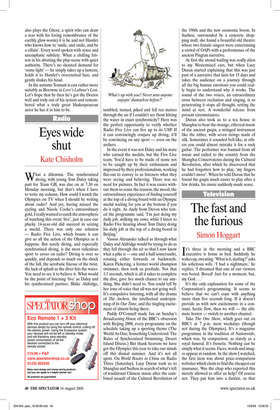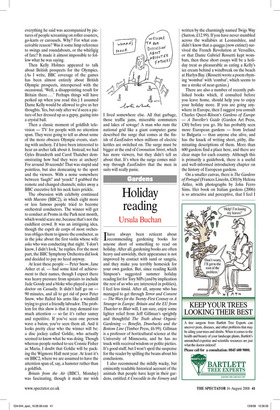Television
The fast and the furious
Simon Hoggart
It’s three in the morning and a BBC executive is home in bed. Suddenly he wakes up, sweating. ‘What is it, darling?’ asks his solicitous wife. ‘I had a nightmare,’ he replies; ‘I dreamed that one of our viewers was bored. Bored! Just for a moment, but, my God ... ’ It’s the only explanation for some of the Corporation’s programming. It seems to believe that we can’t cope with anything more than five seconds long. If it doesn’t provide us with new excitements in a constant, hectic flow, then we will — the ultimate horror — switch to another channel.
Take The One Show, which goes out on BBC1 at 7 p.m. most weekdays (though not during the Olympics). It’s a magazine programme in the tradition of Nationwide, which was, by comparison, as stately as a royal funeral. It’s frenetic. Nothing can be simply what it seems. Faces, words and images appear at random. In the show I watched, the first item was about price-comparison websites which claim to find the cheapest car insurance. Was the chap who reported this merely allowed to offer us help? Of course not. They put him into a funfair, so that everything he said was accompanied by pictures of people screaming on roller coasters, go-karts or carousels. Why? For what conceivable reason? Was it some limp reference to swings and roundabouts, or the whirligig of fate? It made it almost impossible to follow what he was saying.
Then Kelly Holmes appeared to talk about British prospects for the Olympics. (As I write, BBC coverage of the games has been almost entirely about British Olympic prospects, interspersed with the occasional, ‘Well, a disappointing result for Britain there ... ’ Perhaps things will have perked up when you read this.) I assumed Dame Kelly would be allowed to give us her thoughts. Yes, but only after we’d seen a picture of her dressed up as a gypsy, gazing into a crystal ball.
Then a classic moment of goldfish television — TV for people with no attention span. They were going to tell us about some of the more obscure Olympic events, starting with archery. I’d have been interested to hear an archer talk about it. Instead, we had Gyles Brandreth and Carol Thatcher demonstrating how bad they were at archery! For around 30 seconds! That was stupid and pointless, but also demeaning to the sport and the viewers. With a noise somewhere between ‘faugh!’ and ‘yeuck!’ I grabbed the remote and changed channels; miles away a BBC executive felt his neck hairs prickle.
The obsession with celebrity continued with Maestro (BBC2), in which eight more or less famous people tried to become orchestral conductors. The winner will get to conduct at Proms in the Park next month, which would scare me, because that’s not the cuddliest crowd. It was an intriguing idea, though the esprit de corps of most orchestras obliges them to ignore the conductor, as in the joke about the first violin whose wife asks who was conducting that night. ‘I don’t know, I didn’t look,’ he replies. For the most part, the BBC Symphony Orchestra did look and decided to pay no heed anyway.
At least these people — Peter Snow, Jane Asher et al. — had some kind of achievement to their names, though I expect there was heavy pressure from upstairs to include Jade Goody and a bloke who played a junior doctor on Casualty. It didn’t half go on — 90 minutes, and all to get rid of poor Peter Snow, who flailed his arms like a windmill trying to greet a friendly labrador. The problem for this show is that it may demand too much attention — so far it’s rather samey and repetitive. If you’ve seen one person wave a baton, you’ve seen them all. And it looks pretty clear who the winner will be: a disc jockey called Goldie, who actually seemed to know what he was doing. Though whereas people rushed to see Connie Fisher as Maria, I doubt that Goldie will be packing the Wigmore Hall next year. At least it’s on BBC2, where we are assumed to have the attention span of, say, a hamster rather than a goldfish.
Britain from the Air (BBC1, Monday) was fascinating, though it made me wish I lived somewhere else. All that garbage, those traffic jams, miserable commuters and lakes of sewage! A man who runs the national grid like a giant computer game described the surge that comes at the finish of EastEnders when millions of electric kettles are switched on. The surge must be bigger at the end of Coronation Street, which has more viewers, but they didn’t tell us about that. It’s when the surge comes midway through EastEnders that the men in suits will really panic.



























































 Previous page
Previous page